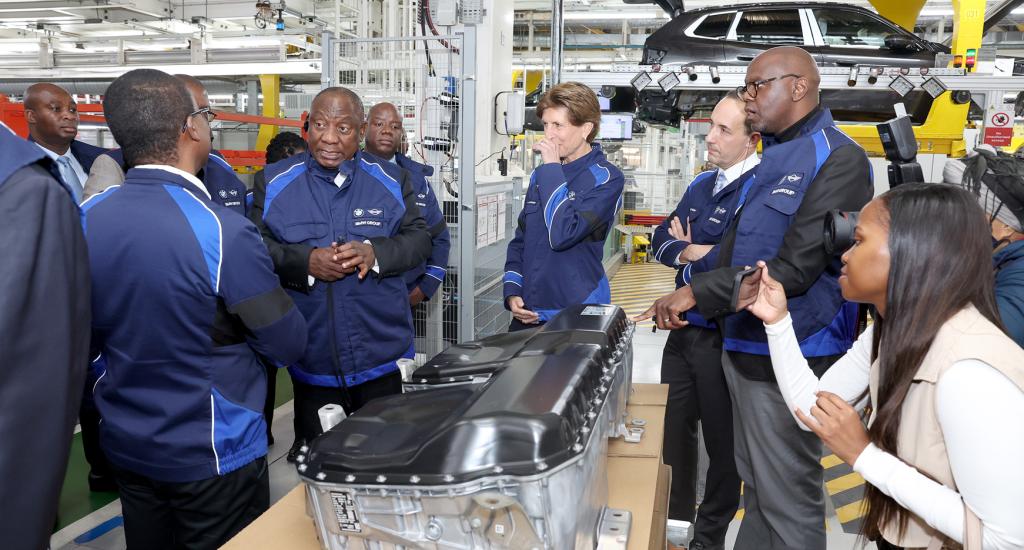Driving the Future: SA's path to electric mobility and industrial competitiveness

South Africa’s automotive industry is a cornerstone of the national economy, contributing 5.3% to the gross domestic product and supporting approximately 110 000 direct jobs, according to Naamsa.
In 2023, the sector generated R270.8 billion in export revenue, with vehicles and components shipped to over 148 countries. Yet, this vital industry faces unprecedented challenges as global markets pivot toward electric vehicles (EVs). With the European Union and United Kingdom set to ban internal combustion engine (ICE) vehicles by 2030 and 2035, respectively, South Africa’s export markets – where 45% of locally assembled vehicles are destined – are at risk.
To remain competitive, South Africa must embrace the global shift to electric mobility while leveraging its industrial strengths and critical mineral resources.
A historic crossroad
The automotive industry is undergoing transformative disruption driven by EVs, Industry 4.0 technologies, the Internet of Things, evolving consumer preferences and stringent regulatory pressures. This shift places South Africa at a critical juncture: will the country lead the transition to electric mobility or risk losing its competitive edge? The question is not whether the transition will occur, but whether South Africa can seize this opportunity to drive innovation, create jobs and strengthen its position in the global value chain.
Thought leadership in action
In May 2025, the Tshwane University of Technology (TUT) hosted a Thought Leadership Seminar through its Institute for the Future of Work (IFOW), themed; “Accelerating and Building Capacity in the Automotive Sector for the Future of Work in South Africa”. The event brought together government, industry, academia and civil society to chart a path for South Africa’s automotive future. Discussions centred on the South African Automotive Masterplan (SAAM) 2035, which aims to integrate the industry into global value chains while promoting local empowerment and competitiveness.
Key seminar insights highlighted the need for:
Enhanced localisation: Increasing local production of components to reduce reliance on imports.
Skills development: Aligning educational curricula with industry needs, particularly for EV technologies and sustainability.
Innovation ecosystems: Fostering research and development (R&D) to create local intellectual property and support advanced manufacturing.
TUT’s project-based learning model, which bridges academia and industry, was showcased as a vital tool for preparing the next generation of automotive professionals.
Government commitment to electric mobility
In July 2025, President Cyril Ramaphosa underscored South Africa’s commitment to the EV transition during the launch of the BMW X3 Plug-in Hybrid EV in Rosslyn, Tshwane. He emphasised the opportunities for local component manufacturing and the potential to leverage South Africa’s vast reserves of critical minerals, such as lithium and cobalt, to position the country as a hub for processing and beneficiation. “The global shift to clean vehicles is not just a challenge but an opportunity for South Africa to redefine its industrial future,” Ramaphosa stated.
The Department of Trade, Industry and Competition has reinforced this vision through its Electric Vehicle White Paper, released in December 2023. The policy outlines a roadmap to establish South Africa as a regional EV production hub, with key measures including:
A 150% tax rebate on qualifying EV investments starting in 2026.
Support for battery manufacturing and component localisation.
Investment in charging infrastructure for urban logistics and long-distance corridors.
Development of EV-specific skills pipelines, including training for technicians, engineers, and charging station operators.
Public-private sector partnership
The Tshwane Automotive Special Economic Zone (TASEZ), a public-private partnership, has attracted over R10 billion in investment and supports a vehicle production capacity of 200 000 units. TASEZ is also gearing up for plug-in hybrid production, signalling South Africa’s readiness to adopt advanced manufacturing capabilities.
Critical challenges ahead
Despite these advancements, significant hurdles remain. Seminar participants identified three critical challenges:
1. Skills misalignment: South African universities lack dedicated EV or automotive engineering programmes. While TUT’s project-based learning initiatives are promising, scaling these efforts requires sustained investment and policy support.
2. Limited local innovation: Most vehicle design and R&D occur abroad, limiting South Africa’s ability to develop proprietary technologies. Investments in prototyping, systems integration, and local intellectual property are essential.
3. Infrastructure bottlenecks: Stable electricity supply and efficient rail-port connectivity are critical for large-scale EV manufacturing and export competitiveness. Energy reliability and logistics remain persistent challenges.
A collaborative path forward
The seminar underscored the need for coordinated action among government, industry, and academia. The partnership between IFOW and TASEZ exemplifies this approach. Together, they are establishing an Automotive Innovation and Skills Development Research Lab to accelerate green mobility, promote local resource beneficiation, and foster inclusive industrialisation, particularly for black-owned and emerging suppliers.
This initiative will align curricula with industry needs through work-integrated learning, develop industry-informed courses to prepare students for future roles and reskill current workers to adapt to the evolving automotive landscape.
This model of academia-industry collaboration is critical to unlocking South Africa’s electric mobility potential. Strategic investments in research, skills development, and partnerships with universities and startups will drive innovation and localisation. Advocacy for policies that prioritise local manufacturing and green technology adoption is equally vital.
A future designed and driven
South Africa’s industrial heritage, strategic geography and human capital position it to become a continental leader in electric mobility. However, this future requires deliberate action. As the SAAM 2035 undergoes review in 2025, policymakers must centre the EV transition in their vision, prioritising:
Innovation: Incentives for local R&D and intellectual property development.
Skills: Expanded training programmes to meet the demands of EV manufacturing and maintenance.
Infrastructure: Investments in energy reliability and logistics to support large-scale production and exports.
Inclusivity: Support for black-owned businesses and emerging suppliers to ensure equitable growth.
With bold leadership and collective resolve, South Africa’s automotive sector cannot only adapt to the global shift to electric mobility but also redefine its role as a competitive, innovative, and inclusive player on the world stage. The time to act is now – South Africa's automotive future is ours to design, build and drive.


